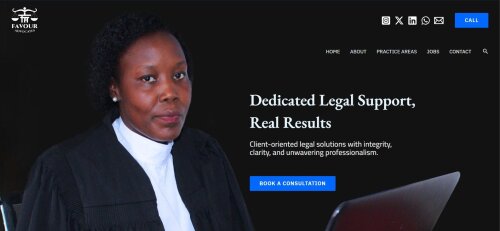Best Estate Planning Lawyers in Uganda
Share your needs with us, get contacted by law firms.
Free. Takes 2 min.
Or refine your search by selecting a city:
List of the best lawyers in Uganda
About Estate Planning Law in Uganda
Estate planning in Uganda involves the legal handling of a person's assets and property distribution upon their death. The objective is to ensure that your assets are passed on to your beneficiaries in a manner that is consistent with your wishes while minimizing taxes and legal complications. Ugandan estate planning laws have evolved over time, operating within the frameworks provided by the Constitution, the Succession Act, and other relevant legislation. This legal field caters to individuals who want to manage the transfer of their assets, settle their estate, and provide for family members even after they are gone.
Why You May Need a Lawyer
There are several reasons why you might need a lawyer for estate planning in Uganda:
- To draft a comprehensive will or trust that ensures your assets are distributed according to your wishes.
- To minimize estate taxes and reduce the expenses and delays of probate.
- To establish durable power of attorney and health care directives for managing your affairs if you become incapacitated.
- To handle complex family dynamics or substantial business interests which require detailed legal arrangements.
- To update or modify your estate plan in response to changes in legislation or personal circumstances.
Local Laws Overview
Key aspects of local laws relevant to Estate Planning in Uganda include:
- The Succession Act: Governs the distribution of a deceased person's property. It outlines how estates are to be managed and distributed in the absence of a valid will.
- The Administrator General’s Act: This law provides the framework for the administration of estates where the deceased did not leave a will.
- Probate and Administration of Estates (Amendment) Act: Offers statutory guidelines for the administration of estates, including processes for appointing executors and managing estate debts.
- Matrimonial Property Act: Regulates matters concerning ownership and distribution of property between spouses.
Frequently Asked Questions
What is a will and why is it important?
A will is a legal document that outlines how you would like your assets to be distributed after your death. It is important because it provides clarity and direction, ensuring that your property is distributed as per your wishes.
What happens if I die without a will in Uganda?
If you die without a will, your estate will be distributed according to the laws of intestacy as outlined in the Succession Act. This may not align with your personal wishes.
Can I appoint someone to make decisions for me if I become incapacitated?
Yes, you can appoint a trusted individual through a durable power of attorney to make financial or medical decisions on your behalf if you become incapacitated.
What is probate, and why is it necessary?
Probate is the legal process of validating a deceased person's will, settling their debts, and distributing their estate. It is necessary to ensure the lawful transfer of property to the rightful heirs.
How can I minimize estate taxes?
Estate taxes can be minimized through strategic estate planning, such as creating trusts, gifting assets during your lifetime, and utilizing spousal exemptions.
Can I change my will after I have created it?
Yes, you can amend or revoke your will at any time, provided you are of sound mind, through a codicil or by creating a new will.
What happens if a will is contested?
If a will is contested, it may lead to legal challenges or litigation in probate court to resolve disputes regarding its validity or terms.
Do foreign wills hold validity in Uganda?
Foreign wills may be recognized in Uganda, but they must meet certain Ugandan legal requirements to be deemed valid within the jurisdiction.
How are joint properties handled in an estate plan?
Jointly held properties typically pass directly to the surviving owner(s) upon death, but specific arrangements can be made in an estate plan to address these assets.
What should I consider when choosing an executor for my will?
When choosing an executor, consider their trustworthiness, ability to manage financial matters, and willingness to fulfill the duties involved in settling your estate.
Additional Resources
For those seeking more information or assistance with estate planning in Uganda, consider reaching out to the following:
- Administrator General’s Office: Provides leadership in the administration of estates.
- Uganda Law Society: Offers a network of legal professionals specializing in various fields, including estate planning.
- Ministry of Justice and Constitutional Affairs: Provides insights into laws and legislation, including estate laws.
Next Steps
If you need legal assistance in estate planning, consider the following steps:
- Research and identify a qualified estate planning lawyer in Uganda.
- Schedule a consultation to discuss your needs and concerns.
- Gather relevant documents and information about your assets and beneficiaries.
- Work with your lawyer to develop or update your estate plan, ensuring it aligns with your current wishes and legal requirements.
- Review your estate plan regularly and make updates as necessary to reflect changes in your circumstances or the law.
Lawzana helps you find the best lawyers and law firms in Uganda through a curated and pre-screened list of qualified legal professionals. Our platform offers rankings and detailed profiles of attorneys and law firms, allowing you to compare based on practice areas, including Estate Planning, experience, and client feedback.
Each profile includes a description of the firm's areas of practice, client reviews, team members and partners, year of establishment, spoken languages, office locations, contact information, social media presence, and any published articles or resources. Most firms on our platform speak English and are experienced in both local and international legal matters.
Get a quote from top-rated law firms in Uganda — quickly, securely, and without unnecessary hassle.
Disclaimer:
The information provided on this page is for general informational purposes only and does not constitute legal advice. While we strive to ensure the accuracy and relevance of the content, legal information may change over time, and interpretations of the law can vary. You should always consult with a qualified legal professional for advice specific to your situation.
We disclaim all liability for actions taken or not taken based on the content of this page. If you believe any information is incorrect or outdated, please contact us, and we will review and update it where appropriate.
Browse estate planning law firms by city in Uganda
Refine your search by selecting a city.














